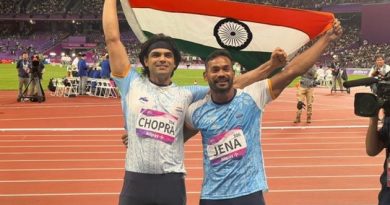“India’s G20 Presidency revolved around philosophy of Vasudhaiva Kutumbakam”: MoS Bharati Pravin Pawar

New Delhi [India], August 17 (ANI): Union Minister of State for Health and Family Welfare Bharati Pravin Pawar addressed the G20 Deputies’ Meeting on Thursday and highlighted that India’s G20 Presidency has revolved around the philosophy of Vasudhaiva Kutumbakam- The world is one family. While addressing the G20 Deputies’ Meeting here today, Pawar said, “India’s G20 Presidency has revolved around the philosophy of Vasudhaiva Kutumbakam-The world is one family. Nowhere is this more important than in the field of global health, as the pandemic taught us, ‘No one is safe until everyone is safe’.
The meeting of the G20 Health Ministers will start on Friday.
The Union Minister underlined the crucial deliberations that have been taking place in the Health Working Groups of India’s G20 Presidency.
Noting that the first priority of addressing Health Emergencies Prevention, Preparedness, and Response (HEPPR) has been a core priority in every G20 Health Working Group since its inception, she said, “The”Indian G20 Presidency has put special focus on the critical threats of One Health, AMR (Anti-microbial resistance), and Climate Change”.
“The second priority is addressing the need to ensure equitable access to affordable medical countermeasures, which highlights the need to establish a global MCM (medical countermeasures) coordination platform that envisions the establishment of RD and manufacturing networks across the globe,” she added.
Pawar also noted that this will enable access to quality and affordable vaccines, therapeutics, and diagnostics (VTDs), especially for the most vulnerable around the world, particularly those in the Global South.
On the development and use of digital health innovations and solutions, which is the third health priority under India’s G20 Presidency, Pawar highlighted that the Global Initiative for Digital Health (GIDH) has been envisaged to have a convergent approach that breaks the silos and ensures that existing and ongoing digital health efforts can be made accessible under one umbrella. “It is an ambitious goal, and with your support and your guidance, GIDH has the potential to be a pioneering example of high-level international cooperation that directly benefits the world”, she said.
Noting that the crucial task of ensuring all the hard work and incredible efforts during the Indian G20 presidency come to fulfilment today, Pawar encouraged the delegates in their discussions.
She said,”The declaration that you will be finalising today will be the culmination of deep and informed discussion that has taken place over three working group meetings and countless bilateral and multilateral meetings”.
The Union Minister further stated that addressing inequality in access to healthcare is at the core of all our efforts under this G20 presidency. The three priorities and their related deliverables have the potential to make global healthcare services more accessible and affordable, especially for people in vulnerable situations and those in low-and middle-income countries.
Sudhansh Pant, Union Health Secretary, highlighted that the COVID-19 pandemic resulted in the rapid development of ad-hoc global mechanisms to address the imperative need to prevent the pandemic from worsening and to plan for future pandemics. This, however, led to considerable duplication of effort and fragmentation.
“Therefore, India’s G20 Presidency has since the beginning emphasised the need for convergence of efforts in the HEPPR space as a major priority to aid in creating a converged and agile Global Health Architecture”, he said.
The Union Health Secretary stated that India’s G20 Health Working Groups and the 14 co-branded events arranged alongside covered the pressing health concerns in the world.
Members of the Troika from Indonesia and Brazil commended the Indian Presidency for prioritising the key health challenges in the world today. They recommended collaboration on adopting a multi-sectoral approach and investing in better health systems. They also underlined the need for efficient decision-making arrangements in the interim Medical Countermeasures mechanism, including effective representation of LMICs (Lower and Middle-Income Countries). (ANI)
Source – Indonesia News




